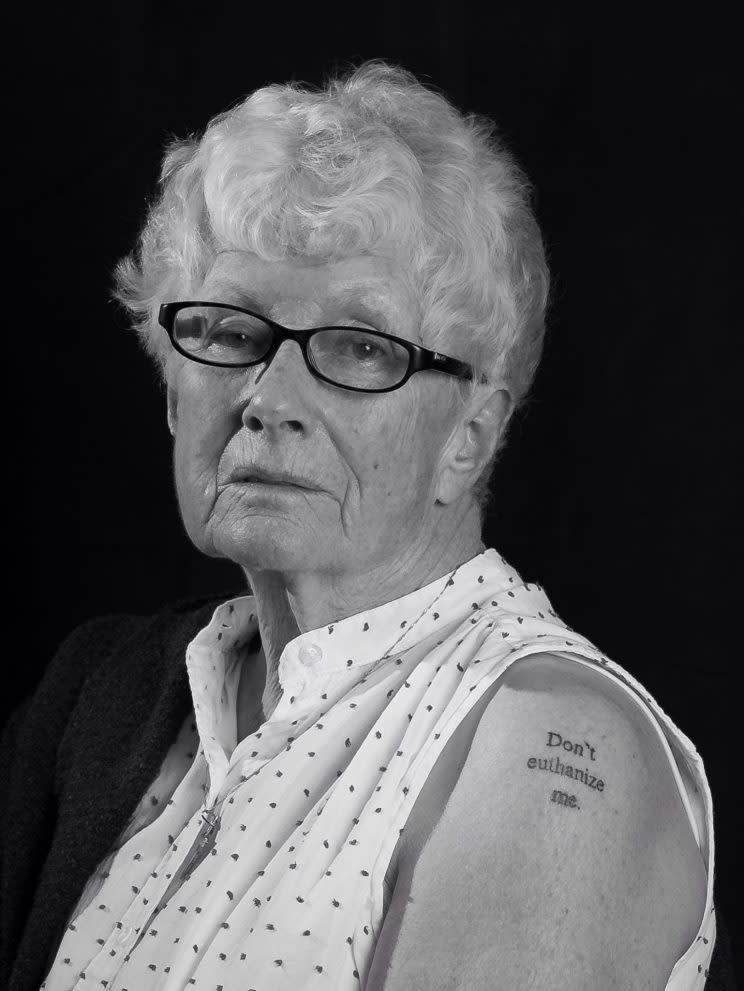Calgary granny gets 'Don't euthanize me' tattooed as sign of faith

Christine Nagel had a small problem when she walked into a Calgary tattoo parlour — she wanted a tattoo on her chest, but the artist said it was so close to her bones it would hurt too much.
The 81-year-old grandmother wanted it on her chest so doctors could see it.
“I’m a Catholic and I wanted ‘Don’t euthanize me’ to be a permanent [declaration],” Nagel told Yahoo Canada News.
She settled on a spot on her shoulder and let the tattoo artist do his thing. (“It didn’t hurt at all,” she said.)
Nagel got the idea when she heard of a Dutch bishop advising his parishioners to carry a card in their wallet making their wishes known.
“But I thought, ‘It’s so easy to lose a piece of paper in your wallet,'” she said.
There are strict parameters in place to administer doctor-assisted dying since the federal government passed its law on the matter last June. But Nagel is not convinced.
“It’s a slippery slope,” she said.
According to the new law, patients must sign a written request about their wish to end their life in front of two independent witnesses. At least 10 days are required before the date of death. And there must be two independent, written medical opinions stating the patient’s medical condition has reached a point that is “grievous and irremediable” and that “natural death is foreseeable.”
Nagel isn’t convinced the safeguards built into the legislature will protect her.
“They start with these definite guidelines and then, they eventually starting thinking, well this person is suffering, there is no cure, it’s painful and so, the patient wants to die,” she said.
A November report by the Canadian Society of Palliative Care Physicians (CSPCP) said only one of every six patients who ask for medically-assisted death will be approved. It also forecasted that most of the 62,400 people projected to request it in 2017 will receive palliative care instead.
Nagel, who turns 82 on Jan. 23, volunteers with palliative patients, taking holy communion with people in hospice care.
When asked about those who don’t have a religion and also have a painful condition in which they don’t want to keep on living, Nagel sticks to her beliefs.
“I think it’s too bad for those who don’t have faith,” she noted. “But even so, in hospice, they get curious about it,” she said, adding some patients ask her about religion when they see her taking communion.

Looking back on her life, which had its beginnings in England, Nagel considers the impact of losing her mother to ALS — also known as Lou Gehrig’s disease — at the age of 11 coupled with her Catholic boarding school experience as key foundations for her anti-euthanasia stance.
“The last few months she was alive she was confined to bed, but she could always talk. She would read books to us,” recalled Nagel, who also had a sister and brother at the time. “When my father was away, one of us would have to sleep with her so that if she was in pain, we’d move her legs so the cramps would go away.”
Just 14 months before dying, Nagel’s mother gave birth to a son. She died in 1945 — at the end of the war: “She wanted to stay as long as she could with us.”
After becoming a teacher and spending a few years in London, Nagel felt she needed a fresh start and boarded a steamer to Canada in 1957. She landed a teaching job in a two-room school in Saskatchewan, married a farmer with whom she adopted seven children.
She has 15 grandchildren now: “It’s never dull.”
“The education I got at the boarding school infused me with this faith,” she said. “(God) has brought me to this world and He will take me back when it’s time. God has a way of deciding when is the best time for you to go.”



